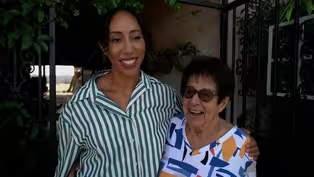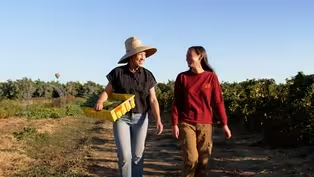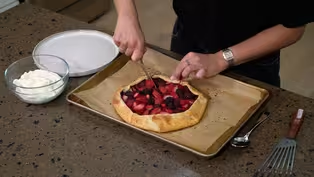
Cultural Foods - Harvesting Health
Clip: 10/4/2024 | 3m 25sVideo has Closed Captions
Our health expert explores the nutritional benefits of culturally significant foods like bitter melo
Can growing your own food in your backyard be good for your health? Turns out it can! Harvesting Health host Dr. Daphne Miller explains how gardening can help improve our gut health.
Problems playing video? | Closed Captioning Feedback
Problems playing video? | Closed Captioning Feedback
America's Heartland is presented by your local public television station.
Funding for America’s Heartland is provided by US Soy, Sustainable Agriculture Research and Education, Rural Development Partners, and a Specialty Crop Grant from the California Department of Food and Agriculture.

Cultural Foods - Harvesting Health
Clip: 10/4/2024 | 3m 25sVideo has Closed Captions
Can growing your own food in your backyard be good for your health? Turns out it can! Harvesting Health host Dr. Daphne Miller explains how gardening can help improve our gut health.
Problems playing video? | Closed Captioning Feedback
How to Watch America's Heartland
America's Heartland is available to stream on pbs.org and the free PBS App, available on iPhone, Apple TV, Android TV, Android smartphones, Amazon Fire TV, Amazon Fire Tablet, Roku, Samsung Smart TV, and Vizio.
Providing Support for PBS.org
Learn Moreabout PBS online sponsorship(gentle music) - As I looked at the variety of interesting greens and beans and gourds and other plants that Li Schmidt is producing, I wondered, when you rediscover these cultural foods, are you actually rediscovering lost medicine?
And the answer is yes.
Take these bitter melon, for example.
They're used in lots of traditional healing systems, including traditional Chinese medicine and Ayurveda.
They are rich in a whole variety of antioxidants that help us prevent diabetes and fight cancer.
Antioxidants are also needed for growth and repair of tissues, your skin, your bones, your hair.
The bitterness tells you how strong their antioxidants are.
It's actually the antioxidants that create that bitter flavor.
They also are rich in vitamin C. In fact, some varieties of bitter melon outperform oranges, which we think of as sort of superfoods when it comes to vitamin C. Farmer Li Schmidt started her business during the pandemic, and what's happened is now as the pandemic is receding, this DIY gardening craze is not going away any time soon, and I personally am amazed by the health benefits that it brings.
By growing your own vegetables, you have ones that are fresher and more nutritious.
The time between picking and eating them is much shorter, so you don't get a breakdown in nutrients, and they are more delicious because it's those very same nutrients that give the plants their interesting flavors.
Gardening is also a great way to get physical activity.
It's good on the joints, bending and standing, and it gives you exposure to sunshine, which gives your body some vitamin D, which is great for your bones.
There's also really interesting research showing that gardening actually impact your microbiome, the population of bacteria and viruses and fungi that live inside of you.
(gentle music) Kneeling in the soil and eating fruits and vegetables from that soil exposes us to healthy bugs that might improve our digestion.
A study comparing the intestinal microbiomes of home gardeners to those who didn't garden found that, by the end of the gardening season, the gardeners actually had changed their microbiome and had microbes in there that looked a lot more like microbes in the soil.
And actually, when they compare the profile of the microbiome of gardeners to hunter gatherer tribes, which we know have a very healthy microbiome, they were very similar, so there seems to be a real benefit to gardening, not only for your mental health and your physical health and for the nutritional value of your food, but also what it does to your gut microbiome.
So today, we learned how a home garden with cultural plants can offer us powerful medicine.
(gentle music)
Video has Closed Captions
Clip: 10/4/2024 | 5m 57s | Visit a farm led by multiple generations of women. (5m 57s)
Video has Closed Captions
Clip: 10/4/2024 | 5m 2s | Meet a Taiwanese-American farmer inspired by her childhood dishes. (5m 2s)
Mixed Berry Galette - Farm to Fork
Video has Closed Captions
Clip: 10/4/2024 | 5m 2s | Learn how to make a mixed berry galette with mascarpone whipped cream. (5m 2s)
Providing Support for PBS.org
Learn Moreabout PBS online sponsorship

- Food
Christopher Kimball’s Milk Street Television
Transform home cooking with the editors of Christopher Kimball’s Milk Street Magazine.












Support for PBS provided by:
America's Heartland is presented by your local public television station.
Funding for America’s Heartland is provided by US Soy, Sustainable Agriculture Research and Education, Rural Development Partners, and a Specialty Crop Grant from the California Department of Food and Agriculture.



